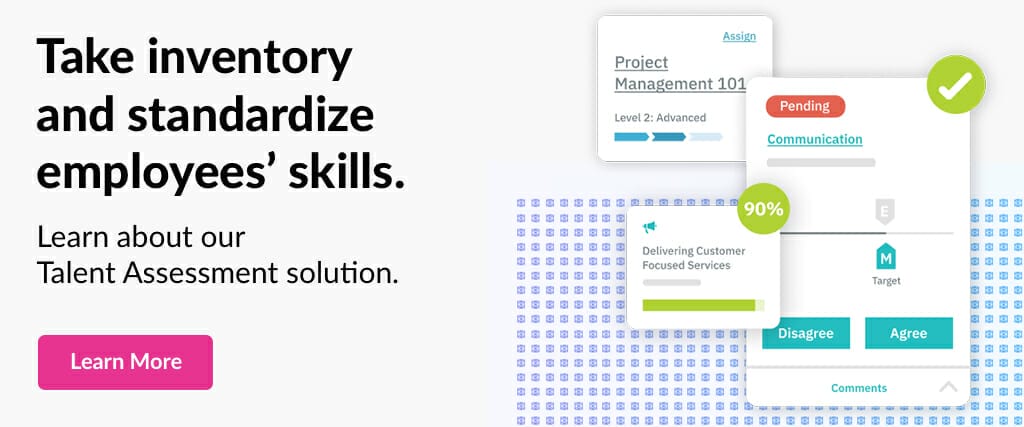The Cost of Avoiding a Skills Gap Analysis

The cost of avoiding a skills gap analysis can be far greater than businesses realize, leading to missed opportunities and inefficiencies. Skill gaps inside the workforce are becoming increasingly prevalent due to technological disruption, the shortened half-life of skills, and talent shortages. A skills gap analysis can help bring clarity for companies facing this challenge to understand the current state of their talent and identify their gaps. Fosway Group reports that Skills Enablement is the number 1 initiative going forward to 2025 and businesses must make this a priority. Proactively working towards closing skill gaps can reap many benefits, however the costs of not addressing them may be even greater than business leaders have realized. Today we will review the major costs of putting off your internal skill gap analysis as well as the specific benefits that can be gained by closing them.
The Financial Cost of Avoiding a Skills Gap Analysis
Put plainly, there is a large financial cost for businesses who are unable to find employees equipped with the skills that managers need. Research shows that skill gaps are currently costing the U.S. economy around $13 billion per month and estimates that number will continue to rise with Deloitte citing an estimated $2.5 trillion total cost over the next decade. This number is contributed to organizations not having a way to track and update internal skills. Not knowing what skills their talent possesses leads to mismatched job roles or duties and can inhibit informed recruiting and succession initiates. With updated and relevant skills being even harder to source in the current workforce, this leads to large financial losses in delays and productivity.
The Performance Cost of Avoiding a Skills Gap Analysis
A skills gap analysis kickstarts the process of identifying each employee’s current skill set and proficiency levels for their current role. If employees aren’t meeting skill requirements for their job, productivity, and performance lowers. According to a recent survey, 70% of respondents stated that they viewed a drop in performance when skill gaps were present in their company. Low performance can affect many areas from increased workplace accidents to negative customer service interactions. Even worse, if companies don’t perform a skills gap analysis, they may not realize the extent at which this is occurring and can’t put into play the necessary development plans. This can directly affect employee retention as well for two reasons. The first is people are more likely to leave their job if they don’t feel sufficiently equipped to perform their duties. The second is that the main reason employees cite for leaving a job is for lack of ability to develop professionally. Your people have a desire to have their skills understood and cultivated and the costs of putting this on the back burner range from decreased performance to them leaving entirely. This hurts the internal efficiency and trust of your organization as well incurs great financial costs.
The Future Cost of Avoiding an Analysis
One of the biggest costs associated with avoiding a skills gap analysis could arise in the future due to the continued talent shortage. A 2020 McKinsey & Company report stated that 87% of companies around the world will encounter a severe talent shortage. Many companies and workers haven’t been able to keep up with current market skill demands due to rapid technical advancement and the shortened half-life of skills. Studies show that 56% of hiring managers anticipate workplace automation and technological interventions such as AI will cause major shifts in the kinds of skills that they will need employees to have in the future. The post baby boomer generations are also significantly smaller than before, and the talent pool continues to shrink daily as experienced workers are entering retirement. Skilled workers are looking for companies that align with their values, interests, and career aspirations, as well as internal development programs. Not understanding the skills present in a business and failing to prepare to develop them will lead to many accruing costs that will rise over time. It is time for companies to begin prioritizing, tracking, and enabling skill development to remain competitive, get ahead of the talent shortage and be prepared for the future.
The costs of not performing a skills gap analysis are great in many different areas and are affecting all industries. McKinsey & Company found that 87% of companies are either currently experiencing skills gaps in their workforce or are anticipating them within the next several years. If companies are able to begin to analyze, track, and develop their talents’ skills, the benefits include:
- Increased employee engagement and retention
- A development and growth culture
- Cost savings, such as recruiting and onboarding
- Improved performance
- Increased adaptability for the future
To begin to see these benefits, organizations should start with being able to answer questions such as:
- Do you know which skills your employees possess today?
- Do you know which skills are in demand for your employees in the future?
- Do you know your gaps across departments?
- Which top skills need attention across your whole company?
Automation may contribute to skill gaps and challenges with skill matching, but when integrated properly into your talent management strategy, it can also be a key player in solving these issues. To learn more about how TalentGuard can help you begin the process of analyzing and tracking your organizations skills, request a demo with us today.
Why You Need to Compare More Than Skills During Talent Selection
Every organization is made up of people who have skills and people who are responsible for utilizing these skills effectively. It can be challenging for managers to understand how to best align employees during talent selections to work productively towards greater business goals. When managers select employees to perform various projects and assignments, there are […]
AI and HR Automation – Where to Start?
AI and HR Automation AI and automation are topics that we are hearing about more than ever. They are applied to countless different processes and currently being adapted across all industries. HR is one of the many departments who is working to fully embrace the application of these methods due to the critical and dynamic […]
The Ultimate Guide To Employee Skill Development
Boost workforce potential with TalentGuard’s 2025 guide to employee skill development —upskill, reskill, and stay ahead in a fast-changing world! The Journey of Employee Skill Development: Strategies, Examples & Tips Every organization thrives on the collective expertise of its employees. Whether you run a small start-up or manage a large corporation, the strength of your […]




